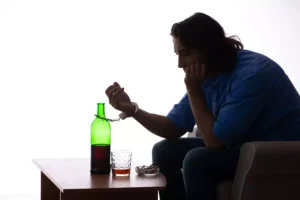
Most symptoms will typically peak five days after they begin and will begin to decrease about five to seven days after they begin. Withdrawal seizures are most typically experienced 24 to 48 hours after the last drink. For people at https://ecosoberhouse.com/ low risk of complications, an office visit to your primary care provider, along with at-home monitoring and virtual office visits, may suffice. People at high risk of complications should enter a short-term in-patient detox program.

3. Questionnaires to detect severity of AWS
Tapering can help avoid serious withdrawal symptoms, including delirium tremens. The aura stage can involve the early stages of a seizure or another warning sign that a seizure is coming. When the seizure begins during the aura stage, it may be called a partial seizure or a simple focal seizure. If it comes with warning signs, you could experience deja vu, intense anxiety, muscle twitches, loss of bowel or bladder control, numbness or tingling, nausea, and confusion.
History and Physical
It occurs in 5-10% of alcohol-dependent people and is a medical emergency. Signs and symptoms of DTs include disorientation, confusion, agitation, hallucinations, fever, sweating, high blood pressure, and fast heart rate. These symptoms can quickly progress to cardiovascular collapse and death without timely treatment. Alcohol withdrawal seizures can occur 6-48 hours after the last drink, sometimes even 2-7 days after you stop alcohol consumption.
- More research is needed to provide a better understanding of the mechanisms that link alcohol or other stimulants and toxins as extrinsic triggers to seizure occurrence.
- The long-term administration of anticonvulsants for uncomplicated ethanol withdrawal seizures is unnecessary and possibly dangerous.
- Withdrawal seizures can occur in patients within just a few hours of alcohol cessation.
- In several studies, possible predictors for the development of a severe AWS have been investigated.
Medication for Alcohol Treatment

Your risk of developing seizures seems to increase with an increasing amount of alcohol. Seizures often seem to develop in the hours after you stop consuming alcohol. People who chronically consume large amounts of alcohol seem to be more likely to have epilepsy than people who don’t.
Alcohol and antiseizure medications
- Consuming alcohol seems to aggravate seizures in people with epilepsy and may lead to increased seizure frequency.
- The spectrum of alcohol withdrawal ranges from a mild physiologic response to seizures and death.
- Chronic alcohol abuse is linked to an increased risk of epilepsy (seizure disorder).
- While the reason for this is not fully understood, alcohol does create changes in receptors in your brain that affect your likelihood of having a seizure.
- Consuming alcohol seems to be a common trigger for seizures in people with epilepsy.
SUDEP is the sudden and unexpected death of a person with epilepsy who is otherwise healthy without a known cause. Prolonged drinking can lead to compensatory changes in your brain, such as the down-regulation of GABA receptors and increased expression of NMDA receptors. If you’re planning on decreasing your dependence on alcohol, consult your doctor. They can recommend inpatient or outpatient care, depending on your current health status.

Consulting a treatment center and entering a medically supervised detox program significantly reduces the risk of relapse, thus lowering the likelihood of withdrawal-induced epilepsy. Doctors have discovered several medications that can reduce the urge to drink as an alcohol-dependent individual’s alcohol withdrawal seizure body adjusts to sobriety. Newborns whose mothers are intoxicated prior to or during delivery can experience withdrawal symptoms, such as tremors and even seizures. Thus, repeated withdrawals during pregnancy may pose an additional risk to the fetus from that of alcohol exposure in itself.
However, they may cause people to fall and sustain potentially serious injuries, such as head injuries. Status epilepticus is a life threatening condition in which a person has a seizure lasting longer than 5 minutes without regaining normal consciousness or has more than one seizure within 5 minutes. Many involve a combination of group psychotherapy (talk therapy) and medications. Someone with epilepsy should not drink alcohol without first discussing the potential risks with a doctor who is familiar with their specific condition. At Discover Recovery, we work with a wide variety of health insurance providers so those in need can get access to the treatment they need.

Treatment / Management
- In most cases, alcohol withdrawal seizures happen within one to three days following the person’s last drink and, like all types of seizures, are caused by a disruption in the communication pathways in the brain.
- Contact your doctor if you or someone you know is experiencing alcohol dependency or withdrawal symptoms.
- Alcohol can be dangerous to abuse, but it can also be dangerous to quit too quickly.
- Clients may only begin acamprosate after completely detoxing from alcohol, which may be one to two weeks after initially abstaining from drinking.
